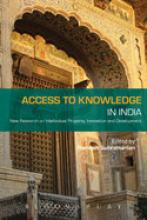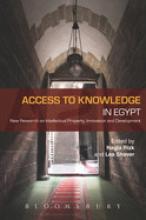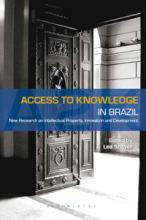Access to Knowledge in India
 Ramesh Subramanian and Lea Shaver (editors)
Ramesh Subramanian and Lea Shaver (editors)
Bloomsbury Academic, 2011
India is a $1 trillion economy which nevertheless struggles with a very high poverty rate and very low access to knowledge for almost seventy percent of its population which lives in rural areas.
This volume features four parts on current issues facing intellectual property, development policy (especially rural development policy) and associated innovation, from the Indian perspective. Each chapter is authored by scholars taking an interdisciplinary approach and affiliated to Indian or American universities and Indian think-tanks. Each examines a policy area that significantly impacts access to knowledge. These include information and communications technology for development; the Indian digital divide; networking rural areas; copyright and comparative business models in music; free and open source software; patent reform and access to medicines; the role of the Indian government in promoting access to knowledge internationally and domestically.
READ MORE
Access to Knowledge in Egypt
 Edited by Nagla Rizk & Lea Shaver
Edited by Nagla Rizk & Lea Shaver
Bloomsbury Academic, February 2010
The conventional wisdom in Egypt examines the issue of intellectual property as a question of policing and enforcement. The high levels of protection indicated by the WTO Agreement on Trade Related Aspects of Intellectual Property Rights are unquestioningly assumed to be desirable. Policy debates—and all too often academic ones as well—focus only on the questions of how to more efficiently tighten IP protection and crack down on “piracy.” Yet a more critical examination is urgently needed, whereby IP law, policy, and practice are viewed from a development perspective, rather than from an enforcement perspective.
This volume takes on this endeavor. It offers the first examination of IP issues in Egypt adopting a multidisciplinary bottom-up approach that aims at maximizing access and contribution to knowledge, and in turn, promoting development. Bringing rigorous empirical research to bear on unquestioned ideologies, the collaborating authors question the conventional wisdom that more IP protection is necessarily better for innovation and development. Contributors: Ahmed Abdel Latif, Hossam Baghat, Jack Balkin, Sherif El-Kassas, Sherif Kamel, Nagal Rizk, Lea Shaver and Rebecca Wright.
READ MORE
Access to Knowledge in Brazil
 Lea Shaver (editor)
Lea Shaver (editor)
Information Society Project, 2008
Access to knowledge is a demand for democratic participation, for global inclusion and for economic justice. It is a reaction to the excessively restrictive international IP regime put in place over the last two decades, which seeks to reassert the public interest in a more balanced information policy. With sponsorship from the Ford Foundation, the Information Society Project has embarked on a new series of access to knowledge research, in partnership with colleagues in Brazil, China, Egypt, Ethiopia, India, Russia and South Africa.
The first book in this series, Access to Knowledge in Brazil, focuses on current issues in intellectual property, innovation and development policy from a Brazilian perspective. Each chapter is authored by scholars from the Fundação Getulio Vargas law schools in São Paolo and Rio de Janeiro and examines a policy area that significantly impacts access to knowledge in the country. These include: exceptions and limitations to copyright, free software and open business models, patent reform and access to medicines, and open innovation in the biotechnology sector. Contributors: Jack Balkin, Lea Shaver, Pedro Nicoletti Mizukami, Ronaldo Lemos, Brunos Magrani, Carlos Affonso Pereira de Souza, Alessandro Octaviani, Monica Steffen Guise Rosina, Daniel Wang, Gabriela Costa Chaves, José Antonio Batista de Moura Ziebarth, Karina Grou, Renata Reis, Thana Campos.
READ MORE

 Ramesh Subramanian and Lea Shaver (editors)
Ramesh Subramanian and Lea Shaver (editors)  Edited by Nagla Rizk & Lea Shaver
Edited by Nagla Rizk & Lea Shaver Lea Shaver (editor)
Lea Shaver (editor)